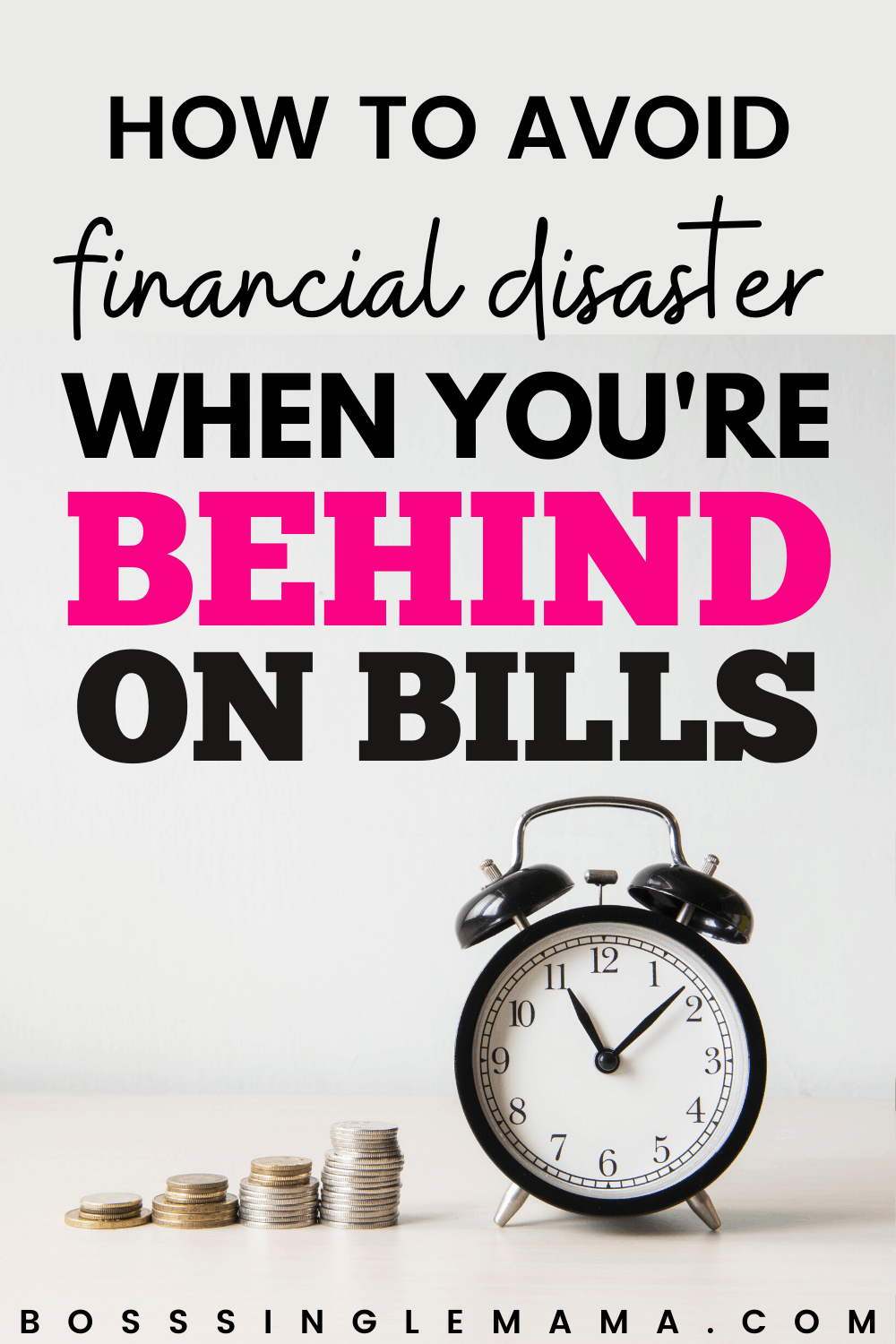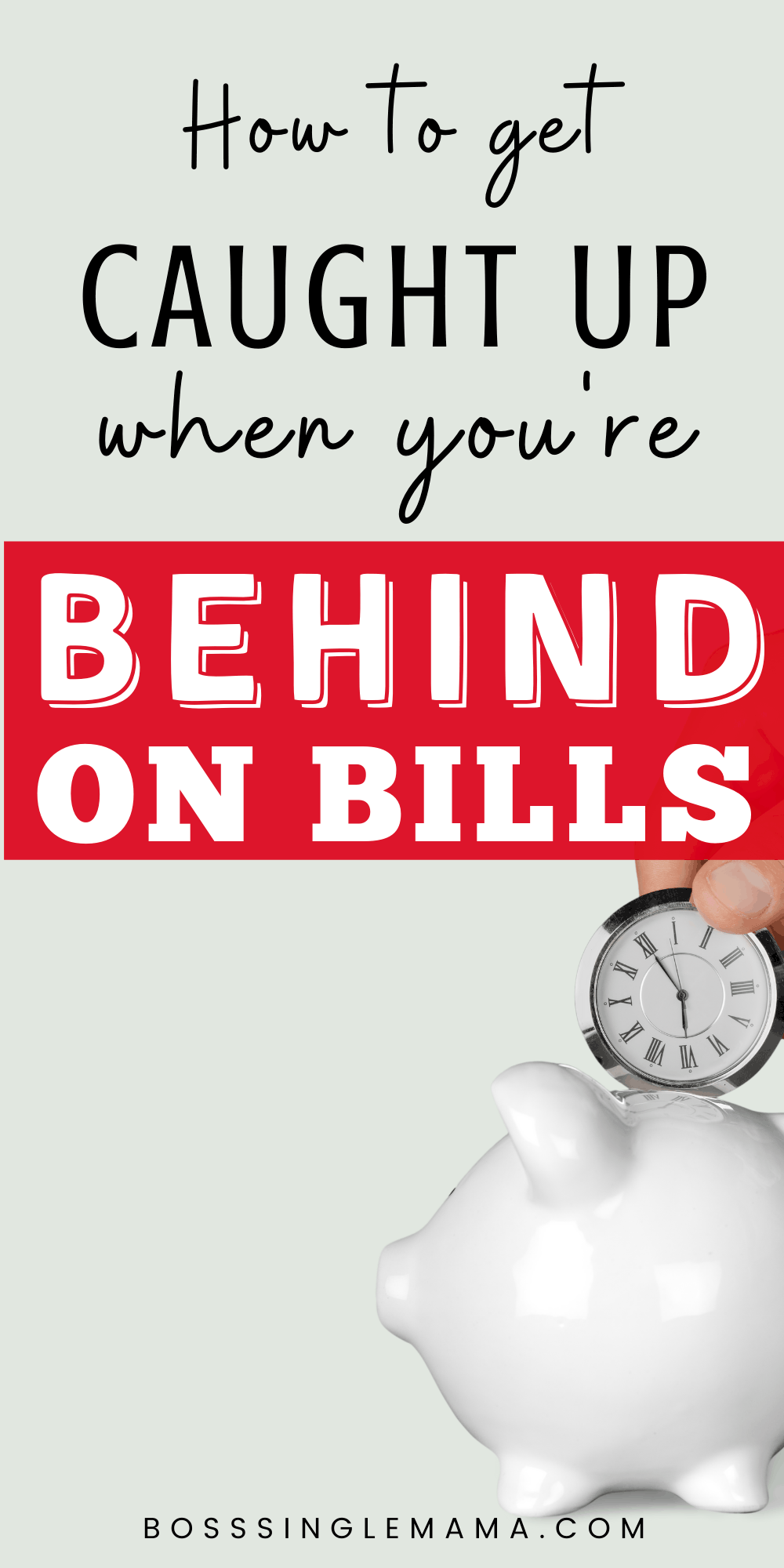Falling behind on bills can happen to the best of us. The good news is, you can do some financial damage control to fix it.
There are lots of reasons why you might fall behind on paying bills.
You could get laid off from work or lose your job, for example. That’s a big one.
Or you might have an emergency that drains your cash, leaving you with nothing to pay the bills.
When you get behind, you need a plan for paying catch up. And that’s what I’ve got for you today.
This post walks you through exactly what to do when you’ve got past due bills that need to be paid.
1. Figure out what you HAVE to pay
When it comes to paying bills when you’re behind, you might need to do a little prioritizing.
So, make a list of every bill you have right now that you’re behind on. For example, your list might include:
- Rent or mortgage payments
- Utility payments
- Cellphone and internet bills
- Credit card bills
- Student loan payments
- Daycare bills
- Medical bills
- Unpaid taxes
Now, what on your list HAS to be paid?
For me, basic living expenses have to be covered before anything else. So that means putting housing and utilities ahead of paying credit cards or medical bills.
Look at your bills and decide what you need to pay right now and what can wait a little longer if you can’t get caught up on everything at once.

2. Figure out what you can afford to pay
Once you know what you need to pay right away when behind on bills, the next step is seeing how much money you have to work with.
Start with your income and what you’re making.
Add up what you could use from your paychecks to get caught on bills, while still leaving you enough money to pay for basic needs like food and transportation.
This is where a budget is really helpful. If you don’t have one yet, making one isn’t that hard.
Here’s what you do:
- Add up all of your income for the month, which might include your paychecks, side hustle income, child or spousal support if you’re a single parent or unemployment benefits.
- Add up everything you spend for a typical month.
- Subtract what you spend from your income.
That’s a simplified version of how a budget works. But it can help you get a handle on how much money you have to pay bills.
RELATED POST:
How to Make a Budget That Actually Works
3. Call your creditors and explain why you’re behind on bills
This next step can feel like the most difficult but it’s essential when you’re behind on bills.
Calling up people you owe money to can be intimidating. But it’s better than just ignoring a stack of unpaid bills and hoping they’ll go away.
Not to mention, ignoring certain bills can wreck your credit score.
Payment history makes up the biggest part of your FICO credit score (35%) so missing credit card payments or loan payments is something you don’t want to do.
Block off an hour or two and call every biller that you have a past-due bill with. That might include:
- Your landlord or mortgage company
- Utility companies
- Your internet or cellphone provider
- Credit card companies
- Your student loan servicer if you still have loans you’re paying down
- The lender for your car loan
Don’t leave anyone out. Then, call them up and explain why you’re behind on paying your bills.
This is a good-faith gesture. Even if you can’t pay what you owe in full right now, your billers at least know you’re trying to make things right.

4. Work out payment plans if you can
If you can’t pay a past-due bill in full, find out what payment plan options there are with each biller.
Getting caught up when behind on credit card bills
A lot of credit card companies offer hardship programs for customers who can’t pay. I used them in my 20s when I got into a boatload of credit card debt and couldn’t make the payments.
Hardship programs can lower your interest rate or minimum payment temporarily. Your card issuer may even allow you to pause your payments until your financial situation improves.
Getting caught up with your rent or mortgage
If you’re behind on rent, call your landlord ASAP to see what you can work out to get caught up.
The longer rent goes unpaid, the more likely you are to end up on the receiving end of an eviction notice. And that’s the last thing you want.
If you’re behind on your mortgage, get in touch with your lender to see what you can do to get caught up. That might include:
- Forbearance. Forbearance means you can put your mortgage payments on hold. Interest still accrues on the loan but this can give you time to get your finances in order if you’re behind on bills.
- Loan modification. A loan modification restructures your payments so you can get caught up if you’ve fallen behind.
- Mortgage refinancing. Refinancing your mortgage could help lower your interest rate and monthly payments.
Getting caught up on car loans
If you fall behind on your car loan, your lender could repossess. Then you’d be out of a car and the money you’ve already paid toward it.
That’s no good. What you can do instead is ask about is skipping a payment or deferring payments in the short-term.
Skip-a-payment programs essentially let you shift your current month’s payment to the end of the loan term.
If you can’t skip a payment, ask your lender if you can reduce your payments temporarily so you don’t lose the vehicle.
Getting caught up on student loans
Student loans come with some built-in options when you’re behind on bills, at least if you owe federal loans.
Deferments, for example, allow you to pause student loan payments if you can’t pay. If you have subsidized federal student loans, the government pays the interest that accrues for you.
Forbearance also lets you pause student loan payments if you’ve exhausted the deferment period. The difference is that you’re on the hook for the interest that accumulates on subsidized loans.
If you have private student loans, ask your lender or loan servicer what you can do to get caught up. Some lenders will cut you a break if you can’t pay your loans because of financial hardship.
Getting caught up on utility bills
Utility companies can be the easiest to work with if you need a payment plan because most of the time, they don’t want to shut you off. Our water company, for example, doesn’t do disconnects at all even if you’re behind.
Call your utility companies and ask what kind of payment plans they have if you’re behind. You might be able to take the past due amount and spread it out over six or 12 months.
You might also ask about a flat-rate billing plan going forward. Flat-rate billing means your bill is predictable every month so it’s easier to budget.
RELATED POST:
11 Ridiculously Easy Ways to Save on Electric
5. Cut or reduce expenses you don’t need
If you’re behind on bills, you might need to get a little ruthless about cutting your spending.
But cutting out or reducing some of your expenses, even temporarily, could help you get caught up.
For example, here are some things I’ve done to cut expenses because money was tight:
- Bought a pair of clippers and cut my son’s hair at home instead of spending money at a salon
- Switched from a contract cellphone plan to prepaid (Check out Tello for cellphone plans starting at just $5/month!)
- Ditched cable and switched to streaming Amazon Prime (try it free for 30 days!), Netflix and Hulu on my Roku instead
- Found free things to do at home as a family instead of going out
- Cut name-brand items out of my grocery budget
Those are some of the obvious ways to cut expenses. The more creative you can get, the better.
If you need help figuring out what to cut, the Trim Financial Manager can help. Trim reviews your spending to find unnecessary expenses, like bank fees or subscriptions, that you can cut out of your budget.
RELATED POST:
21 Things to Stop Buying to Save Money Every Month
6. Sell something to bring in money when you’re behind on bills
Selling stuff can put cash in your hands in a pinch.
You can sell things around the house you no longer need on Facebook Marketplace, local bargain groups or through selling apps.
Here are a few of my favorites:
- Decluttr: Great for selling DVDs, CDs, video games and toys
- Second Sale: Good if you have books to sell
- ThredUP: For selling gently used clothes
- Gazelle: Great for selling electronics
If you need some inspiration for things you can turn into quick cash, check out this list of 27 things you can sell right now for money.
7. Look into financial assistance programs
When you need financial assistance or emergency financial help, there are lots of places you can look.
Government programs, non-profits, charities and churches can all provide financial assistance if you’re behind on bills. Here a few resources you might want to look into if you’re going through a tough time financially.
Government financial assistance programs
- Temporary Assistance for Needy Families (TANF): The TANF program can offer financial help with basic needs like food and housing.
- Low Income Home Energy Assistance Program (LIHEAP): The LIHEAP program can help with heating and cooling bills. The program also helps within things like weatherization to help lower utility bills.
- Medicaid and Children’s Health Insurance Program: Medicaid provides health care for low-income families. CHIP offers low-cost health care for children in families that make too much to qualify for Medicaid.
- Women, Infants and Children (WIC): The WIC program provides moms of newborns to toddlers with vouchers to purchase necessary food items.
- Supplemental Nutrition Assistance Program (SNAP): SNAP offers eligible individuals and families help with purchasing food.
Charities that offer financial assistance
- Feeding America: Feeding America operates a network of food pantries and food banks that provide food for individuals and families.
- 2-1-1: 2-1-1 is sponsored by United Way and offers financial help with lots of things, including utility bills.
- Salvation Army: The Salvation Army operates several programs to provide financial help to people who need it, including food pantries and emergency housing.
- Volunteers of America: You can try Volunteers of America if you need help with finding affordable housing.
Local financial assistance resources
You can also check out local agencies for financial help if you’re in dire straights. Here’s a quick list of places you might be able to get emergency financial assistance:
- Churches
- Your county’s social services department
- Local fraternal orders, like an Elks or Moose Lodge
- Local nonprofits that serve low-income families
If you need more ideas for getting financial assistance, here’s a great resource from the federal government.

8. Work out a new monthly budget
If you’re gradually starting to get caught up after being behind on bills, work on putting a new budget together to help you stay on track.
Your new budget should take into account what you’re earning, what your regular expenses are and what, if anything, you might be paying on a payment plan to get caught up.
On the spending side, go through your expenses again to see if there’s any way to cut your budget further.
If you have credit card debt, commit to putting the cards away for now and not adding to your charges. The goal should be to live at your means, if not below them so you don’t fall behind again.
Finally, consider adding a line item for savings into your budget.
Even if you can only afford to save $15 or $20 every payday, that money can add up over time. Having some money stashed in a savings account can lower the odds of getting behind on bills again.
RELATED POSTS:
CIT Bank Review: Is It the Best Online Savings Account for Your Money?
5 Life-Saving Tips for Budgeting Your Money in a Crisis
9. Talk to a credit counselor if you’re struggling to catch up
If you’ve done all of the above and you’re still having a tough time catching up on bills, it may be time to call in professional help.
A nonprofit credit counselor can go over your expenses and bills with you to help you come up with a plan for getting caught up.
They can also offer suggestions on things like debt consolidation to help you get credit cards under control, or bankruptcy if you’re looking at a worst-case scenario.
If you’re not sure where to look for help, the National Foundation for Credit Counseling is a good place to start.
10. Brainstorm money-making ideas so you don’t get behind bills again
Sometimes you get behind on bills because life throws you a major curveball.
Losing your job, for example, could come as a major surprise.
In that case, having some backup sources of income can help you avoid falling behind on paying bills.
If you know me and this blog at all, you know I’m a huge fan of side hustles. So if you’re looking for some ways to make extra money, here are some of my absolute favorite ways to do it:
Get paid to write online
When I’m not blogging, I’m running a freelance writing business full-time. Freelance writing is great because it’s flexible, there’s the potential to make a lot of money and it’s a creative way to earn an income.
If you’re interested in learning how to get started with freelance writing, this ultimate beginner’s guide can help.
Or, you can take the leap and sign up for this FREE email course that covers everything you need to know to start making money as a freelance writer!
Start a blog
Blogging is a popular way to make money online. And anything you earn could help you avoid getting behind on bills again.
Starting a blog is pretty easy. You just need a domain name, a web host and a basic theme to get up and running.
If you need a hosting recommendation, my vote is for Siteground. It’s super easy to set up a WordPress blog with Siteground even if you’re a non-techie type like me. And their customer service has saved my butt more than once.
If you’re ready to become a blogger, check out this step-by-step guide to starting a blog.
Become an online teacher
Teaching online is another great way to make real money. And you don’t necessarily need a teaching degree to do it.
Outschool, for example, lets you create an online class and teach kids K-12, no degree needed. On average, Outschool teachers earn $35 an hour and you can pick and choose when you want to teach.
The other great thing about Outschool is that you can teach what you’re passionate about. You just have to pass a background check and have your course approved by Outschool.
This guide covers everything you need to know to start teaching on Outschool.
Other ways to make extra money so you don’t get behind on bills
- Take surveys with SurveyJunkie
- Earn cashback when you shop with Rakuten and Ibotta
- Become a dog walker or pet sitter with Rover
- Create and sell printables with Shopify
- Sell handmade items on Etsy
- Flip and resell items on eBay
- Take this free webinar to learn how to proofread
- Or try this free course to become a paid transcriptionist
- Become a stylist with Stella & Dot
- Get paid to shop with Instacart
When it comes to getting ahead financially so you don’t end up behind again, every extra penny counts.
RELATED POSTS:
27 Things You Can Sell to Make Money Without Leaving Home
31 Best Side Hustles for Moms to Make an Extra $500 a Month
13 Best Survey Sites for Making Quick and Easy Money
If You’re Behind on Bills, You CAN Fix it
Being behind with paying the bills isn’t a great situation to be in but there are things you can do to turn it around.
These tips are designed to give you a game plan you can act on right now so you can start getting caught up.
Have you ever been behind on paying bills? What did you do to fix the situation?
Head to the comments and tell me about it. And don’t forget to pin and share this post!
